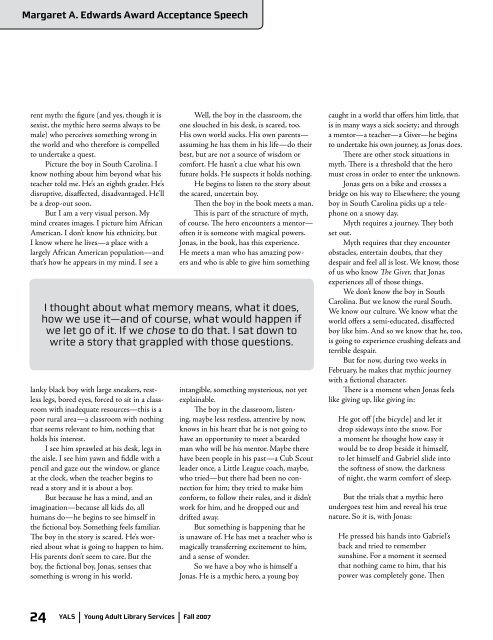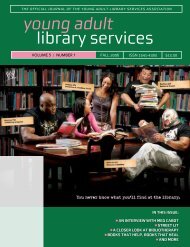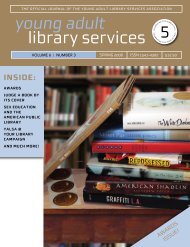Fall 2007 - YALSA - American Library Association
Fall 2007 - YALSA - American Library Association
Fall 2007 - YALSA - American Library Association
You also want an ePaper? Increase the reach of your titles
YUMPU automatically turns print PDFs into web optimized ePapers that Google loves.
Margaret A. Edwards Award Acceptance Speech<br />
rent myth: the figure (and yes, though it is<br />
sexist, the mythic hero seems always to be<br />
male) who perceives something wrong in<br />
the world and who therefore is compelled<br />
to undertake a quest.<br />
Picture the boy in South Carolina. I<br />
know nothing about him beyond what his<br />
teacher told me. He’s an eighth grader. He’s<br />
disruptive, disaffected, disadvantaged. He’ll<br />
be a drop-out soon.<br />
But I am a very visual person. My<br />
mind creates images. I picture him African<br />
<strong>American</strong>. I don’t know his ethnicity, but<br />
I know where he lives—a place with a<br />
largely African <strong>American</strong> population—and<br />
that’s how he appears in my mind. I see a<br />
lanky black boy with large sneakers, restless<br />
legs, bored eyes, forced to sit in a classroom<br />
with inadequate resources—this is a<br />
poor rural area—a classroom with nothing<br />
that seems relevant to him, nothing that<br />
holds his interest.<br />
I see him sprawled at his desk, legs in<br />
the aisle. I see him yawn and fiddle with a<br />
pencil and gaze out the window, or glance<br />
at the clock, when the teacher begins to<br />
read a story and it is about a boy.<br />
But because he has a mind, and an<br />
imagination—because all kids do, all<br />
humans do—he begins to see himself in<br />
the fictional boy. Something feels familiar.<br />
The boy in the story is scared. He’s worried<br />
about what is going to happen to him.<br />
His parents don’t seem to care. But the<br />
boy, the fictional boy, Jonas, senses that<br />
something is wrong in his world.<br />
Well, the boy in the classroom, the<br />
one slouched in his desk, is scared, too.<br />
His own world sucks. His own parents—<br />
assuming he has them in his life—do their<br />
best, but are not a source of wisdom or<br />
comfort. He hasn’t a clue what his own<br />
future holds. He suspects it holds nothing.<br />
He begins to listen to the story about<br />
the scared, uncertain boy.<br />
Then the boy in the book meets a man.<br />
This is part of the structure of myth,<br />
of course. The hero encounters a mentor—<br />
often it is someone with magical powers.<br />
Jonas, in the book, has this experience.<br />
He meets a man who has amazing powers<br />
and who is able to give him something<br />
I thought about what memory means, what it does,<br />
how we use it—and of course, what would happen if<br />
we let go of it. If we chose to do that. I sat down to<br />
write a story that grappled with those questions.<br />
intangible, something mysterious, not yet<br />
explainable.<br />
The boy in the classroom, listening,<br />
maybe less restless, attentive by now,<br />
knows in his heart that he is not going to<br />
have an opportunity to meet a bearded<br />
man who will be his mentor. Maybe there<br />
have been people in his past—a Cub Scout<br />
leader once, a Little League coach, maybe,<br />
who tried—but there had been no connection<br />
for him; they tried to make him<br />
conform, to follow their rules, and it didn’t<br />
work for him, and he dropped out and<br />
drifted away.<br />
But something is happening that he<br />
is unaware of. He has met a teacher who is<br />
magically transferring excitement to him,<br />
and a sense of wonder.<br />
So we have a boy who is himself a<br />
Jonas. He is a mythic hero, a young boy<br />
caught in a world that offers him little, that<br />
is in many ways a sick society; and through<br />
a mentor—a teacher—a Giver—he begins<br />
to undertake his own journey, as Jonas does.<br />
There are other stock situations in<br />
myth. There is a threshold that the hero<br />
must cross in order to enter the unknown.<br />
Jonas gets on a bike and crosses a<br />
bridge on his way to Elsewhere; the young<br />
boy in South Carolina picks up a telephone<br />
on a snowy day.<br />
Myth requires a journey. They both<br />
set out.<br />
Myth requires that they encounter<br />
obstacles, entertain doubts, that they<br />
despair and feel all is lost. We know, those<br />
of us who know The Giver, that Jonas<br />
experiences all of those things.<br />
We don’t know the boy in South<br />
Carolina. But we know the rural South.<br />
We know our culture. We know what the<br />
world offers a semi-educated, disaffected<br />
boy like him. And so we know that he, too,<br />
is going to experience crushing defeats and<br />
terrible despair.<br />
But for now, during two weeks in<br />
February, he makes that mythic journey<br />
with a fictional character.<br />
There is a moment when Jonas feels<br />
like giving up, like giving in:<br />
He got off [the bicycle] and let it<br />
drop sideways into the snow. For<br />
a moment he thought how easy it<br />
would be to drop beside it himself,<br />
to let himself and Gabriel slide into<br />
the softness of snow, the darkness<br />
of night, the warm comfort of sleep.<br />
But the trials that a mythic hero<br />
undergoes test him and reveal his true<br />
nature. So it is, with Jonas:<br />
He pressed his hands into Gabriel’s<br />
back and tried to remember<br />
sunshine. For a moment it seemed<br />
that nothing came to him, that his<br />
power was completely gone. Then<br />
24 YALS | Young Adult <strong>Library</strong> Services | <strong>Fall</strong> <strong>2007</strong>









